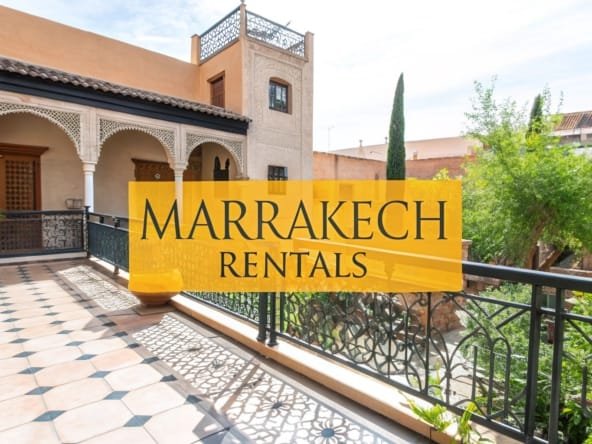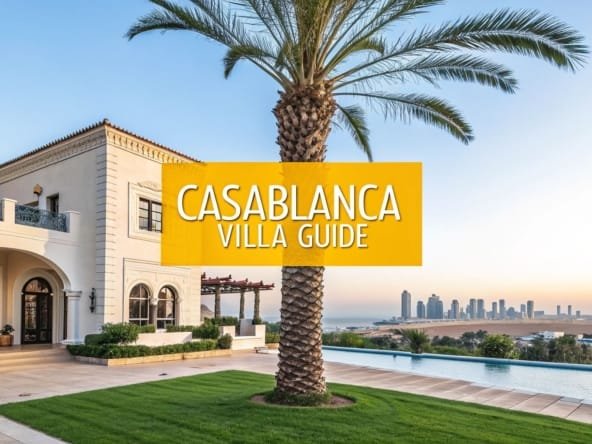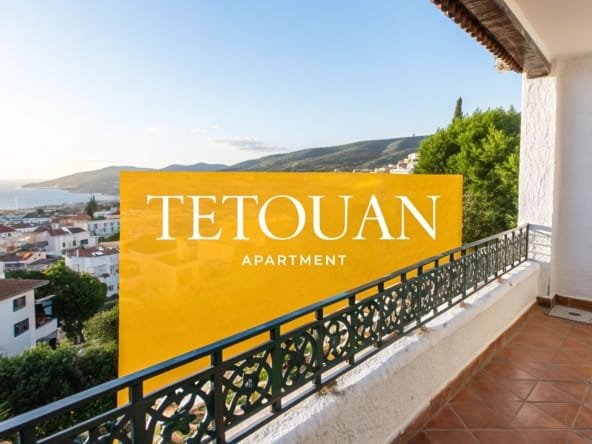If you're thinking about buying an apartment in Agadir—or as the locals say, acheter appartement agadir—you're looking at a market that's genuinely exciting right now. Agadir isn't just another coastal town; it's a unique mix of modern living and deep-rooted Moroccan culture. This makes it a fantastic spot for both people looking for a beautiful home and smart investors chasing real value.
Why Now is the Time to Buy an Apartment in Agadir
Making a move in property is a big deal, and honestly, timing can make all the difference. For anyone with their eye on Agadir, the stars are aligning in a way that makes a compelling case for acting sooner rather than later. This city is more than just a place to catch some sun. It’s a growing urban hub with a clear plan for the future, which is exactly what you want to see when you're investing your money.
This isn't just about finding a nice place to live. It's about making a sound financial decision. The city's economic health, government initiatives, and ongoing urban projects have created a sweet spot for buyers.
The Economic Winds Are in Your Favour
One of the strongest arguments for buying now is Morocco's economic climate. The country has done a great job of keeping its economy steady, with inflation under control and a stable currency. For a property buyer, this is gold. It means your money holds its value, giving you a solid, secure base for your investment.
On top of that, the Moroccan government is actively rolling out the welcome mat for property buyers. There are specific tax breaks for first-time owners and Moroccans living abroad, which can significantly ease the financial side of things. This, combined with a surge in foreign investment in cities like Agadir, has funded major infrastructure upgrades, making the city even more attractive. It’s a strategic moment to get in. You can learn more about these economic tailwinds and why this year is shaping up to be perfect for buying property in Morocco.
Key Takeaway: Right now, the combination of a stable economy and supportive government incentives has created an ideal environment for buying property in Agadir. It's a rare and powerful mix of positive factors that puts the buyer in a strong position.
Getting to Know Agadir's Neighbourhoods
To figure out if Agadir is truly for you, you have to understand its different districts. Each one has its own vibe, lifestyle, and price tag. Whether you're after the buzz of a tourist hub or the quiet of a residential street, Agadir has a place that will feel right.
A great way to start is by comparing what each area has to offer. I've put together a quick snapshot to help you see the differences at a glance.
Agadir Neighbourhood Snapshot for Apartment Buyers
This table offers a comparative overview of popular neighbourhoods in Agadir, designed to help you pinpoint the best fit for your lifestyle and investment goals.
| Neighbourhood | Typical Price Range (per sq. m.) | Best For | Key Features |
|---|---|---|---|
| The Tourist Zone | 12,000 – 18,000 MAD | Holiday homes & rentals | Beachfront, promenade, endless cafes and restaurants. |
| Founty | 15,000 – 22,000 MAD | Families & luxury buyers | Modern residences, high-end complexes, quieter atmosphere. |
| Hay Mohammadi | 8,000 – 11,000 MAD | Long-term residents & investors | Authentic local life, affordable prices, high growth potential. |
| Agadir Marina | 20,000 – 30,000 MAD | Premium lifestyle buyers | Stunning sea views, direct yacht access, chic boutiques. |
This table should give you a clearer picture, but let's break it down a bit further.
-
The Tourist Zone: This is the beating heart of Agadir. It's right by the beach, with a bustling promenade packed with restaurants and shops. An apartment here is a no-brainer if you want a holiday getaway or a rental property that will be in constant demand from tourists.
-
Founty: Think of Founty as the city's sleek, modern cousin. It's more upscale, filled with beautiful villas and luxury apartment buildings. It’s quieter than the tourist centre but still just a stone's throw from the action, making it a top choice for families and buyers with a taste for the finer things.
-
Hay Mohammadi: If you want to experience real Agadir, this is your spot. Hay Mohammadi offers a more authentic residential vibe and, crucially, more accessible property prices. It’s a fantastic option for anyone planning to live here full-time or for an investor looking for solid growth as the city expands.
-
Agadir Marina: For the ultimate in luxury living, the Marina is unmatched. We're talking gorgeous apartments with incredible sea views, with private yachts, designer shops, and fine dining right on your doorstep. This is the prime location for a premium lifestyle and a high-value, prestigious asset.
Of course, this is just scratching the surface. Finding the right apartment is more than just a simple purchase; it’s about aligning your personal dreams and financial strategy with the perfect spot in this incredible city.
Decoding the Agadir Real Estate Market
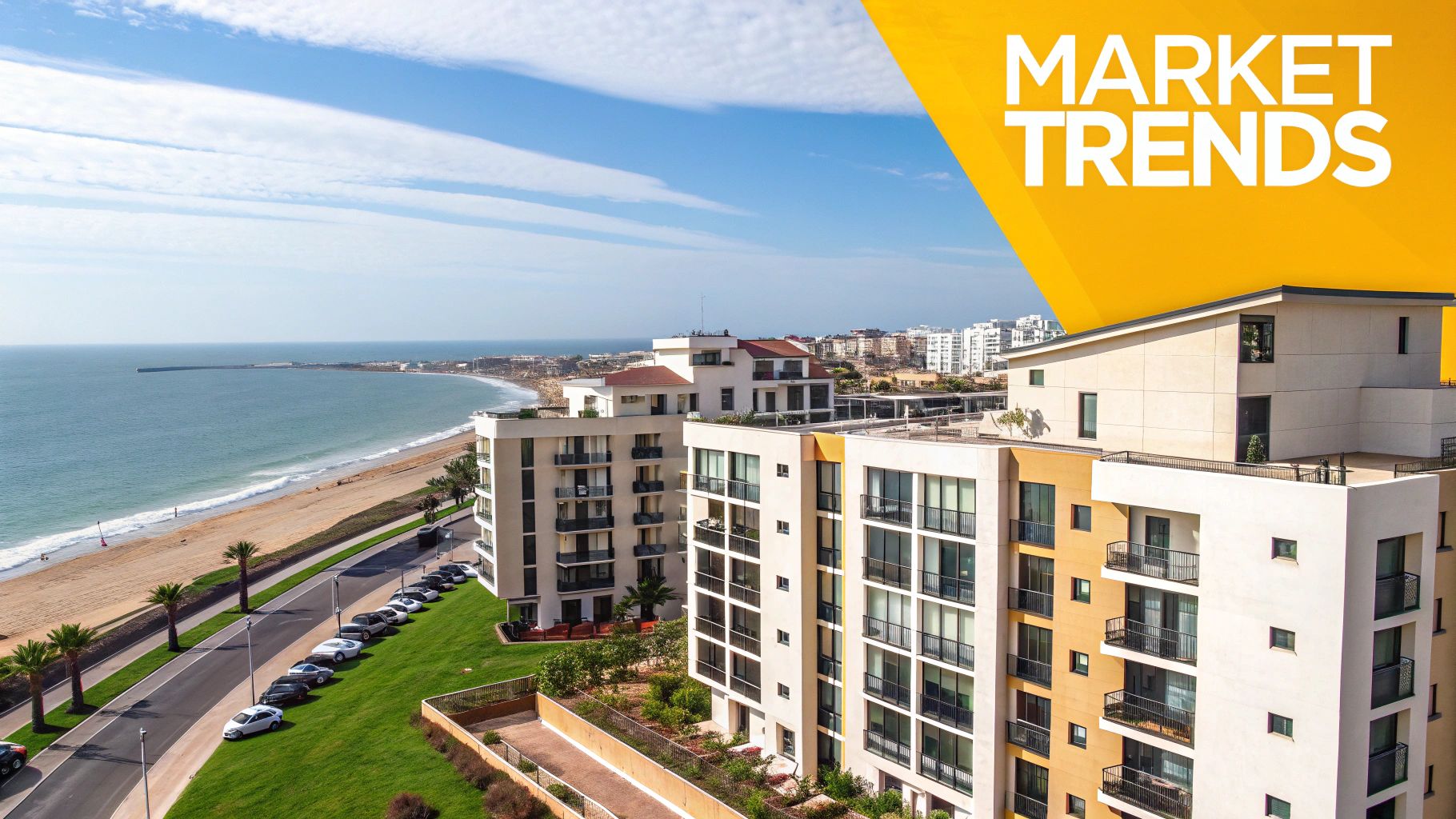
If you're serious about buying an apartment in Agadir, you need to look past the shiny brochures and get a real feel for the market's pulse. It has its own unique rhythm, driven by local economics, buyer confidence, and the kinds of properties on offer. A truly smart purchase is always grounded in solid data, not just a gut feeling.
Developing this insight means learning to read the market signals. Are prices shifting? Are sales volumes up or down? Answering these questions gives you a massive advantage, helping you spot genuine value and negotiate from a much stronger position.
Right now, the Agadir market is showing some interesting nuances. The latest data points to a period of adjustment, which is actually great news for savvy buyers. Residential property prices have seen a slight nominal dip of 1.4%. But when you account for inflation, the real-terms decrease is a more significant 2.3%.
This softening in price is happening alongside a drop in sales activity. The number of transactions fell by 3.1% year-over-year in the first quarter, with an even steeper 14.3% drop from the previous quarter. This cooling-off period mirrors broader economic trends, as Morocco's GDP growth has settled after a strong rebound. For a more detailed look at the numbers, you can explore the full price history and economic context for Moroccan property trends.
Understanding Property Types and Locations
Knowing the numbers is one thing, but you also need to understand what you're actually buying. Agadir’s property scene is incredibly diverse, with everything from brand-new builds to charming older apartments.
Here's a quick rundown of what you'll find:
-
New Developments (VEFA): Mostly found in expanding areas like Founty or near the Marina, these are properties sold off-plan (Vente en l'État Futur d'Achèvement). They come with modern finishes, good security, and that new-home smell. The trade-off? They usually command a premium price.
-
Resale Apartments: This is the bread and butter of the Agadir market. You can find these existing properties in every neighbourhood, from the lively city centre to quieter residential spots like Hay Mohammadi. They often offer more character and better value per square metre.
-
Renovation Projects: If you have a bit of vision, an older apartment in an established area can be a hidden gem. Yes, they need extra cash for modernisation, but you get to create a space that's truly yours and potentially unlock significant value.
The real secret is matching the property type to your personal goals. An investor looking for rental income might jump on a modern, turnkey flat in the Tourist Zone. On the other hand, someone looking for a home might prefer the space and community feel of a resale property in a neighbourhood like Dakhla.
How to Evaluate an Apartment Listing Like a Professional
When you first start browsing listings online, it's easy to get swept up by the slick photos and flowery descriptions. To make a smart decision, you have to dig deeper. A professional buyer has a system for evaluating every single property.
Forget the fancy staging for a moment and focus on the fundamentals. The building's age and overall condition are critical. Always ask about the "syndic" (the building's management committee) and the monthly charges. A well-managed building with a healthy maintenance fund is a huge plus. To see these principles in action, take a look through our current Agadir property for sale listings.
Here’s a practical checklist I use when I'm assessing a property:
- Price Per Square Metre: This is non-negotiable. Calculate it for every apartment you see and compare it to the average for that specific neighbourhood. It's the quickest way to spot an overpriced listing.
- Orientation and Light: Think about where the sun is. South-facing apartments are often brighter and warmer, which is a real bonus during the cooler months.
- Layout and Flow: Does the floor plan actually work? Is the space used well, or is it full of awkward corners and wasted corridors? A bad layout is hard to live with and even harder to sell later on.
- Condition of Communal Areas: Don't just look inside the apartment. Pay close attention to the state of the building's entrance, staircase, and any shared spaces. If these areas are neglected, it's a major red flag about how the building is managed.
By combining this kind of meticulous evaluation with a clear understanding of market data, you stop being just a house hunter and become a strategic buyer. That foundation of knowledge is what ultimately leads to a purchase you’ll be happy with for years to come.
Getting to Grips with the Moroccan Property Buying Process
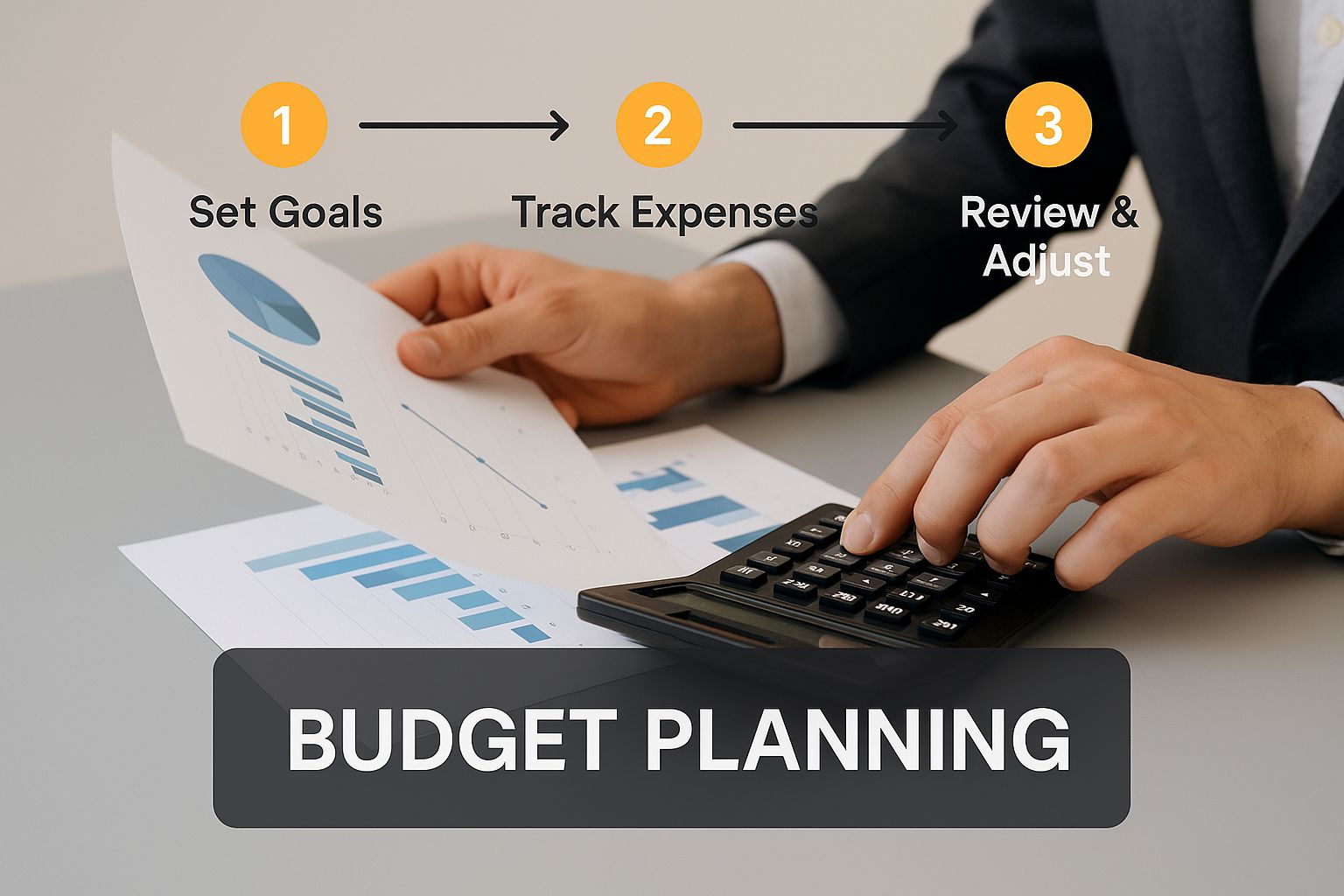
Before you even think about legal paperwork, the image above gets to the heart of the matter: you need a solid budget. That's the real starting point. A successful purchase in Agadir begins with a clear financial plan, so you know exactly what you can afford before you fall in love with a property.
When you decide to acheter appartement agadir (buy an apartment in Agadir), you'll be stepping into a legal system that’s robust and well-established, designed to protect everyone involved. While it might sound daunting to navigate foreign property law, the Moroccan system is surprisingly straightforward once you understand the key people and documents. The whole process is built on transparency and security.
The central figure in any transaction is the Notaire, or notary. It's vital to grasp that a Moroccan Notaire isn't just a lawyer; they're a public official appointed by the state. Their job is to act as a neutral third party, ensuring the entire transaction is above board and legally sound. Honestly, their involvement is indispensable.
The Notaire handles all the crucial due diligence. This means they dig deep into the property's history, checking for any hidden debts, mortgages, or outstanding disputes. This is your single most important safety net.
The First Formal Step: Compromis de Vente
Once you've found the perfect apartment and shaken hands on a price, it's time to make it official with the compromis de vente, or preliminary sales agreement. This is a legally binding contract that locks in the property for you, detailing all the terms of the sale.
Here’s what you’ll find in this agreement:
- A complete description of the apartment.
- The final, agreed-upon price.
- The payment timeline, including the deposit.
- Any special conditions (clauses suspensives), like the sale being contingent on securing a mortgage.
At this point, you'll typically pay a deposit, usually 10% of the purchase price. This money doesn’t go to the seller directly. Instead, it’s held safely in the Notaire's secure escrow account until the final papers are signed. Think of this agreement as a clear, legally binding roadmap for both you and the seller.
A critical piece of advice I always give my clients: Never, ever sign a compromis de vente without your Notaire reviewing it first. This document commits you to the purchase, so making sure every single detail is correct and serves your interests is absolutely essential.
For a more detailed look at the legal ins and outs, our guide on how to buy property in Morocco easily is a great resource that answers many common questions.
Due Diligence: The Notaire's Most Important Job
In the weeks between signing the preliminary agreement and the final sale, your Notaire is hard at work behind the scenes. Their primary focus is conducting exhaustive checks to secure your ownership. The Notaire will verify the seller’s title and, most critically, obtain the certificat de propriété.
This certificate is the official land registry document that confirms:
- Who the legal owner is.
- The precise size and boundaries of the property.
- That the property is free and clear of any liens, mortgages, or legal claims (charges foncières).
You can think of the certificat de propriété as the property's passport. A clean certificate is the green light you need to move forward. Without it, the sale simply cannot, and should not, proceed.
The Finish Line: Acte de Vente and Taking Ownership
The final moment arrives with the signing of the acte de vente, the definitive deed of sale. This is when the property officially becomes yours. The signing ceremony happens at the Notaire's office, where you'll transfer the remaining balance of the purchase price to their escrow account.
Once the acte de vente is signed by both you and the seller and authenticated by the Notaire, the deal is nearly done. The Notaire’s final task is to register the sale with the land registry (Conservation Foncière). This crucial step updates the certificat de propriété to show your name as the new legal owner.
This registration provides you with an unchallengeable title deed, known as a Titre Foncier. It’s a system that offers one of the highest levels of property ownership security in the world, making your investment in Agadir both a smart and a safe one. By following this trusted legal path, you can move from making an offer to holding the keys with complete confidence.
Financing Your Apartment Purchase in Agadir

Now for the part that turns your dream into a concrete plan: sorting out the finances to acheter appartement agadir. This is where you map out how you'll fund the purchase, and having a clear strategy gives you a massive advantage when it comes to negotiating.
Whether you're planning to pay with cash or secure a mortgage, knowing your numbers inside and out gives you confidence. Let's walk through the options available to both Moroccan residents and international buyers.
Getting a Mortgage from a Moroccan Bank
For most people, a mortgage is the most realistic path to buying an apartment here. The good news is that Moroccan banks are generally receptive to lending to foreign nationals, but you need to know their rules.
As a non-resident, you can typically expect banks to finance between 60% and 70% of the property’s value. This means you'll need to have a significant down payment ready to go.
My advice? Don't just walk into the first bank you see. You'll want to shop around and get offers from a few key players known for working with international clients. Start with these:
- Attijariwafa Bank
- BMCE Bank (Bank of Africa)
- CIH Bank
- Banque Populaire
Each one will have slightly different interest rates and lending criteria. It’s worth the effort to compare them, as even a seemingly small difference of 0.5% on your rate can save you a substantial amount of money over the years.
The Application Process and What You'll Need
Once you’ve identified a potential lender, it's time to assemble your application file. Your goal is to paint a clear and convincing picture of your financial standing.
Be prepared to gather the following documents:
- Proof of Identity: A copy of your passport is essential.
- Proof of Income: This could be recent payslips, an employment contract, or tax returns from your home country.
- Bank Statements: Most banks want to see your statements for the last three to six months to verify your savings and cash flow.
- The Compromis de Vente: You'll need the preliminary sales agreement for the specific apartment you're buying.
The bank reviews all this to assess your ability to handle the monthly repayments. This isn't a quick process—it can take several weeks—so I always recommend starting these conversations with banks early, perhaps even before you've settled on a final property.
A big decision you'll have to make is between a fixed-rate or a variable-rate mortgage. A fixed rate gives you predictable payments, shielding you from any future interest rate increases. A variable rate might look more attractive at the start, but it carries the risk of fluctuation. For long-term planning and peace of mind, most buyers I've worked with feel more secure with a fixed rate.
Don't Forget the Closing Costs
The mortgage isn't the final number. It’s absolutely critical to budget for the additional closing costs, known locally as frais d'acquisition. These are non-negotiable fees that are part of every property transaction in Morocco.
Here’s a general idea of what to expect.
Breakdown of Typical Closing Costs
| Fee Type | Estimated Percentage of Purchase Price |
|---|---|
| Registration Tax | 4% |
| Notary Fees | ~1% – 1.5% |
| Land Registry Fee | ~1.5% |
| Stamp Duty | Varies (a minor cost) |
| Agency Commission (if applicable) | 2.5% (+VAT) |
All in, you should budget for these costs to be around 7-10% of the purchase price, on top of your down payment. Your notary will give you a precise breakdown before you sign the final deed, so there won't be any unpleasant surprises. Understanding all the costs upfront is the key to making a smart, secure investment in your new Agadir home.
From Holiday Home to High-Earning Rental
For most people, buying an apartment in Agadir isn't just about securing a personal getaway; it's a smart financial move. The city is a magnet for both tourists and long-term residents, creating a vibrant rental market. With the right strategy, your new property can be a powerful income-generating asset.
The first big question to ask yourself is: what are my goals? Are you picturing a bustling short-term let, welcoming sun-seeking holidaymakers year-round? Or does the predictable income of a long-term tenant feel more your speed? Each approach has its own rhythm, rewards, and responsibilities.
Capitalising on Agadir's Booming Tourist Market
Given Agadir's reputation as a top-tier holiday destination, the allure of short-term rentals is hard to ignore. Demand spikes during European holidays and the peak summer season, allowing you to command much higher nightly rates than you could with a long-term lease.
The numbers back this up. A deep dive into the local market reveals a significant opportunity for apartment owners. A typical Agadir rental is booked for around 182 nights a year, which works out to an average occupancy rate of 50%. With an average daily rate of roughly MAD 516 (about $51), that can generate annual revenues close to MAD 90,000 (or $8,000). There's definitely competition—with over 2,200 active listings on platforms like Airbtics.com—but the market is clearly thriving.
A Word of Advice: Short-term rentals can be incredibly lucrative, but they're far from a "set it and forget it" investment. To succeed, you need to be actively involved, provide top-notch guest service, and make sure your property truly shines.
To help you get a clearer picture of the income potential, here’s a look at how revenue can fluctuate based on Agadir's seasonal demand.
Projected Monthly Airbnb Revenue in Agadir
This table provides an estimate of monthly revenue based on typical seasonal demand, helping you plan for income fluctuations throughout the year.
| Month | Average Occupancy Rate | Average Daily Rate (MAD) | Projected Monthly Revenue (MAD) |
|---|---|---|---|
| January | 40% | 480 | 5,760 |
| February | 45% | 500 | 6,750 |
| March | 55% | 520 | 8,580 |
| April | 65% | 550 | 10,725 |
| May | 50% | 510 | 7,650 |
| June | 60% | 530 | 9,540 |
| July | 75% | 600 | 13,500 |
| August | 80% | 650 | 15,600 |
| September | 60% | 540 | 9,720 |
| October | 55% | 520 | 8,580 |
| November | 45% | 500 | 6,750 |
| December | 50% | 510 | 7,650 |
As you can see, planning around the high-season months of July and August is key to maximising your annual returns.
The Big Decision: Manage It Yourself or Hire a Pro?
Once you’ve decided to rent out your property, you’ll hit a fork in the road. Do you take a hands-on approach and manage it yourself, or do you bring in a local property management company? There’s no single right answer—it all comes down to your personal situation, how much time you have, and whether you live nearby.
Here's a breakdown to help you weigh your options:
Going it Alone (Self-Management)
- The Upside: You keep 100% of the income. Every dirham earned goes straight into your pocket. You also have total say over who you rent to and how the property is run.
- The Downside: It’s a serious time commitment. You're the one handling bookings, cleaning schedules, late-night check-ins, and any emergencies that pop up. This becomes incredibly challenging if you don't live in or near Agadir.
Bringing in a Professional
- The Upside: It’s a completely hands-off solution. A good manager handles everything from marketing your listing to coordinating maintenance. Their local network of trusted professionals is invaluable.
- The Downside: This convenience comes at a price, usually a commission between 15-25% of the gross rental income. You also give up some of the day-to-day control.
For most international investors, hiring a professional manager is the most practical path. They become your eyes and ears on the ground, making sure your apartment is maintained and your rental business is running smoothly. It’s a classic trade-off: giving up a slice of the profit in exchange for your time and peace of mind.
Thinking about the long-term strategy is just as important as the initial purchase. To explore this further, take a look at our article on why properties in Morocco are perfect for investment.
Ultimately, making your Agadir apartment profitable means doing your homework. By truly understanding the market, forecasting your potential income, and choosing a management style that fits your life, you can turn your property purchase into a successful and rewarding venture.
Common Questions About Buying in Agadir
The thought of buying an apartment in Agadir is exciting, but it’s natural to feel a bit of uncertainty, too. Moroccan property law can seem complex from the outside, but with the right guidance, it’s a straightforward process to navigate. Let’s tackle some of the most common questions that pop up, so you can move forward with confidence.
“Knowing exactly what to expect cuts the stress in half and speeds up your purchase.”
We'll walk through the essentials: your rights as a foreign buyer, the extra costs to budget for, why the notary is so crucial, and how you can even manage the purchase from abroad.
Can Foreigners Legally Buy Property in Agadir?
Yes, absolutely. As a foreigner, you have the right to purchase titled urban property, known as Titre Foncier, in Agadir without needing any special authorisations. The only major restriction is on agricultural land. This open policy applies whether you’re looking for a holiday getaway or a permanent home.
That said, trying to go it alone is risky. Your best bet is to work with local professionals. A good real estate agent knows the market inside and out, and a notary is essential for ensuring every legal detail is handled correctly under Moroccan law.
I recently advised a French couple who bought a beautiful flat in the Marina. The whole process took just eight weeks. Their agent handled the viewings and negotiated the offer, while the notary managed all the legal checks. One key piece of advice I gave them was to insist on fully translated title documents—it’s a simple step that prevents any costly misunderstandings down the line.
- Always get title documents translated to avoid surprises.
- Your agent should conduct thorough checks with the land registry.
- Make sure the developer has a solid track record before buying off-plan.
- Don't forget to review the homeowner association rules.
To move your funds into the country, you'll need to open a Moroccan bank account in convertible dirhams. This is a standard procedure, and your notary or agent can walk you through it.
What Are the Additional Costs Beyond the Property Price?
The sticker price isn't the final number. You should always budget for additional fees, which typically add up to around 7-10% of the property’s value. It’s crucial to factor these in from the start.
Here’s a general breakdown of what to expect:
- Registration Tax: A 4% government tax on the property transfer.
- Notary Fees: Usually between 1% and 1.5% for drafting and legal authentication.
- Land Registry Fees: About 1.5% to officially record your ownership.
- Agency Commission: Typically 2.5% + VAT, which is often split between the buyer and seller.
- Miscellaneous Costs: Budget for smaller items like stamp duty and minor administrative charges.
| Fee Type | Percentage | When It's Due |
|---|---|---|
| Registration Tax | 4% | At the final sale signing |
| Notary Fees | 1 – 1.5% | Upon signing the contract |
| Land Registry Fees | ~1.5% | After the final signing |
| Agency Commission | 2.5% + VAT | When the transfer is complete |
These percentages can shift slightly depending on the specific property. To be safe, always ask your notary for a detailed cost estimate (état prévisionnel) well before you’re due to close.
“Planning for all fees up front avoids surprises and keeps your purchase on track.”
On a MAD 1,000,000 property, for instance, these extra costs can easily add another MAD 70,000. Seeing that number in black and white early on makes all the difference.
What is the Notary's Role and Is It a Legal Requirement?
In Morocco, the notary (or Notaire) isn’t just a lawyer—they are a state-appointed official whose involvement is mandatory. Their primary job is to ensure the entire transaction is legal, transparent, and correctly registered.
The notary's key responsibilities include:
- Verifying the seller’s title deed and checking for any liens or debts.
- Ensuring all taxes and mortgages on the property are cleared.
- Drafting the final deed of sale, the acte de vente.
- Registering your new ownership with the official land registry (Conservation Foncière).
This due diligence process usually takes between two and four weeks. Before the final meeting, you'll receive draft documents to review, giving you plenty of time to ask questions.
For example, a Spanish client of mine had their deed fully secured and registered in just 21 days last spring. The notary's thoroughness is what gives you indisputable proof of ownership.
It’s also worth noting that notary fees are set by law, so they aren’t negotiable. If language is a concern, you can—and should—find a notary who is fluent in English or your native language.
Do I Need to Be Present in Morocco for the Whole Process?
You don't have to be in Agadir for every single step, which is great news for international buyers. It’s best to be there in person for the initial viewings and to sign the preliminary sales agreement, the compromis de vente.
After that, you can grant a power of attorney, known as a procuration, to a trusted representative like your lawyer or notary. This person can then sign the final acte de vente on your behalf. To make it legally binding, the procuration must be officially stamped at a Moroccan consulate in your home country.
When drafting the document, be very specific about the powers you are granting and include an expiry date. If your power of attorney isn't in French or Arabic, you'll need a certified translation.
This flexibility makes it entirely feasible to acheter un appartement à Agadir even if your schedule doesn't allow you to stay in the country for the entire closing period. Just be sure to maintain regular contact with your agent and notary to stay updated on the progress.
Ready to start your search? Partner with Rich Lion Properties to find, finance, and finalise your ideal apartment. Visit our website today and turn your Agadir property dreams into reality.

